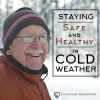As the weather gets colder, various winter safety risks start to develop, both inside and outside the home. If you’re a senior who plans to spend winter in a cold climate, you need to be conscious of these dangers. Here’s some helpful information that can help keep you safe and healthy during this chilly season.
Prevent slippery falls
Falls are very common during the winter, as streets, walkways and stairs get covered in ice. While young kids can rebound fairly quickly from fall-related injuries, older people have much harder paths to recovery. According to Care.com, many older adults sustain severe head trauma, lacerations and hip and wrist fractures after falling on ice.
To avoid falls, always wear shoes that are supportive and have non-slip soles. If you use a cane, make sure it has a new tip for better traction. Always wait until paths are cleared of snow and ice before leaving your home, and don’t hesitate to ask for assistance when walking even just a short distance.
Stay warm
Keep yourself as warm as possible this winter by taking precautions when you’re outside and at home. When you venture outdoors, make sure you’re always sporting weather-appropriate clothing, including a warm coat, a hat, a scarf and gloves. Wear thick socks to prevent your feet from getting too cold as well. Of course, if temperatures are unbearably cold, always stay home.
When you’re inside, dress in layers that you can easily add or remove depending on your body temperature. The National Institute on Aging suggested keeping your thermostat at a minimum of 68 degrees. Even at this temperature, it’s still a good idea to wear a sweater around the house. The source explained that older people lose body heat very quickly, which can lead to severe cases of hypothermia.
Keep your mind and body in top shape
Many seniors experience seasonal depression during colder months, usually because they have less social contact. If you feel isolated in your home during the winter, arrange a check-in schedule with friends, family and neighbors, suggested Care.com. If you have concerns about being alone for extended periods of time, see if you can stay with a loved one when the temperature drops.
The source also noted that you may need to make dietary adjustments during the winter. People often experience vitamin D deficiencies when it gets cold, so try to incorporate milk, tuna, salmon, grains and other vitamin D-heavy foods into your meals.
If you found an error, highlight it and press Shift + Enter or click here to inform us.



